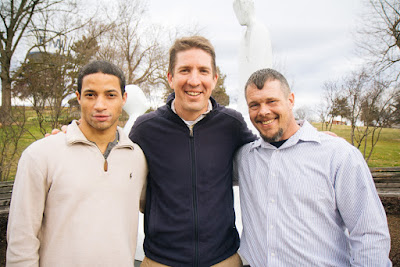 |
| Local Jail Chaplain Jason Wagner, center, with Willie Scott and Nathan Comer (photo by EMU Weekly Digest photographer Macson McGuigan) |
by Christopher Clymer Kurtz
When Eastern Mennonite Seminary Master of Divinity candidate Jason Wagner presented his capstone integration project this spring, he was introduced by Nathan Carr, a man he’d gotten to know on the job.
“God works through him in one of the worst places a person can be,” Carr said. “I and many others are thankful to have had and still have the jail chaplain in our lives.”
A licensed minister, Wagner serves through Virginia Mennonite Missions in the Rockingham-Harrisonburg Regional Jail. He leads Christian services, offers pastoral care, coordinates visiting ministries, and advocates for active church involvement in jail ministry. In his months-long project, Wagner set out to explore “what it means to seek healing and redemption within the walls of a punitive system.”
Carr met Wagner while serving a jail sentence last year, after experiencing an “overwhelming” feeling of relief on a night he spent crying and praying. “God reached out and spoke to me and touched me and healed me,” Carr said – and the next morning, his pastor suggested he connect with Wagner.
The two would create a “friendship and brotherhood in Christ,” Carr said. “It was always exciting to hear what verse or helpful advice he had to offer.”
Wagner recounted his experiences and thoughts from his research and jail chaplaincy in a presentation titled “Against the Grain,” which began with a description of a Sunday evening service in the jail:
Twenty to 30 men crowd into a small classroom to have a time of worship. The men are dressed in orange jumpsuits and come cuffed together in twos from their pods. The visiting ministers and I stand by the door, shaking hands and introducing ourselves to the inmates.
One of my practices when leading worship in the jail is to proclaim over the gathered inmates that they are the church. Furthermore, I name that the presence of God is within the jail and that we, together, are a people, brothers in Christ, called to love and serve one another. I also name that in our worship, we experience what we are made for – to commune with God.
‘Just show up’
Jason Wagner serves through Virginia Mennonite Missions in the Rockingham-Harrisonburg Regional Jail. He leads Christian services, offers pastoral care, coordinates visiting ministries, and advocates for active church involvement in jail ministry.
For years, Wagner has interacted with people just out of the jail and facing difficulties, in part through his involvement at Harrisonburg’s Our Community Place.
Ministering inside a jail, in an “overwhelming” and traumatizing system that violates human dignity, is a calling that’s no more noble than any other, he said in an interview. Rather, “God places you where you’re at. You just show up and be a faithful presence, an expression of being with, in a robust way.”
That’s the Gospel, in his words: “We have a propensity to instrumentalize the Gospel, to make it a means to an end,” he said. “But it is the end. It’s the means and the end – a tangible community in and outside the system. A ministry of presence – that’s what I’m called to.”
In his chaplaincy, Wagner observed the traumagenic nature of incarceration that can result in the ongoing transmission of despair. “The intense conditions of being crammed into a place with other very stressed and hurting people creates the potential for an experience of even deeper pain and disorientation,” he said.
But worship, he said – quoting Angola Prison Seminary director John Robins – can be place for inmates to “reinterpret their personal history,” and allows space for incarcerated people to make positive choices as humans rather than as merely navigators of punitive dehumanization.
It’s “an act of subversion of the world,” he said, “because it projects a new world in which people can imagine life and wholeness in redemptive and new ways.”
Wagner speaks of such spiritual awakening with familiarity. At age 22 he had a “mystical experience” that resulted in conversion through an “encounter in relationship that made my life shift on its axis.” In subsequent years he became a founding member and elder of Early Church in Harrisonburg, and as a seminary student, he delved into the Bible through “academic, critical study of sacred text” even while asking, “How is this text living and active?”
The call
Carr’s eagerness to connect with Wagner is an example of “the deep cry and hunger for the redemptive love of Christ” that Wagner observed as part of “my own jailhouse conversion” during his first time leading music in the jail, he wrote in a 2017 Virginia Mennonite Conference article.
“The Lord Jesus calls us – the church – to be salt and light in a world that is bland and dark,” he wrote. “The jail is a significantly dark and bland corner in our community, housing deeply wounded exiles who are doomed to repeat their crimes if left isolated.”
Wagner’s capstone presentation ended with a message for the church, which he said is “compelled by the good news of Jesus to be on mission and boldly open up to those suffering in our community.”
Particularly “given that the majority of those who are housed in our local jail will soon re-enter our community,” he said, “it is the call of the church to draw near and open its doors and do the work of healing and discipleship that sets people free to do the right things for the right reasons.”
Link to EMU News Digest:
https://emu.edu/now/news/2018/
P.S. After his recent release from the local jail, Nathan Comer lived with Wilmer and Mary Louise Lehman for several weeks prior to Christmas, 2017, as a part of a support team provided by the local Mt. Clinton Mennonite Church.
No comments:
Post a Comment